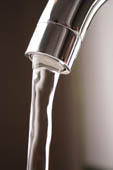
Purpose
To determine the pH level of both city water and well water to determine which is more basic and which is more acidic.
Additional information
Many people report that well water is better for you than city water. They also report that it tastes better, as well water does not undergo chemical treatment when city water does.
Sponsored Links
Required materials
- 2 test tubes or other small container for water collection
- 20 pH strips with guide
- Journal or logbook
- Source of city water
- Source of well water
- Test tube labels or labeling marker
Estimated Experiment Time
This experiment will most likely take several hours.
Step-By-Step Procedure
- 1. Label one of the test tubes “City Water” and make sure you are only using this test tube for that type of water.
- 2. Collect one sample of water and use the pH strip to test its pH level. Record your findings.
- 3. Repeat step two with nine more samples of city water, for a total of ten city water samples.
- 4. Label the second test tube “Well Water” and make sure you are only using this test tube for that type of water.
- 5. Repeat steps two and three for the well water.
Note
The pH strips can easily be found at your local home and garden supply store. You can use the same test strips that are used to test the pH of pools or ponds, as long as they are pH testing strips and come with a color guide that allows you to accurately determine the pH level of the water from the used strips.
Observation
You can tape the test strips in your journal as part of your observation or use them as part of your science fair project display. You can also create a graph of your findings to easily display the pH information of both the city and well water.
Result
The results of the experiment depend on the information obtained from the pH strips for both types of water. Did one type of water exhibit a higher or lower pH level than the other? If so, how much of a difference was there? Were the pH levels about the same? Based on the information obtained during your experiment, which type of water do you think is the best for drinking?
Sponsored Links
Take a moment to visit our table of Periodic Elements page where you can get an in-depth view of all the elements,
complete with the industry first side-by-side element comparisons!